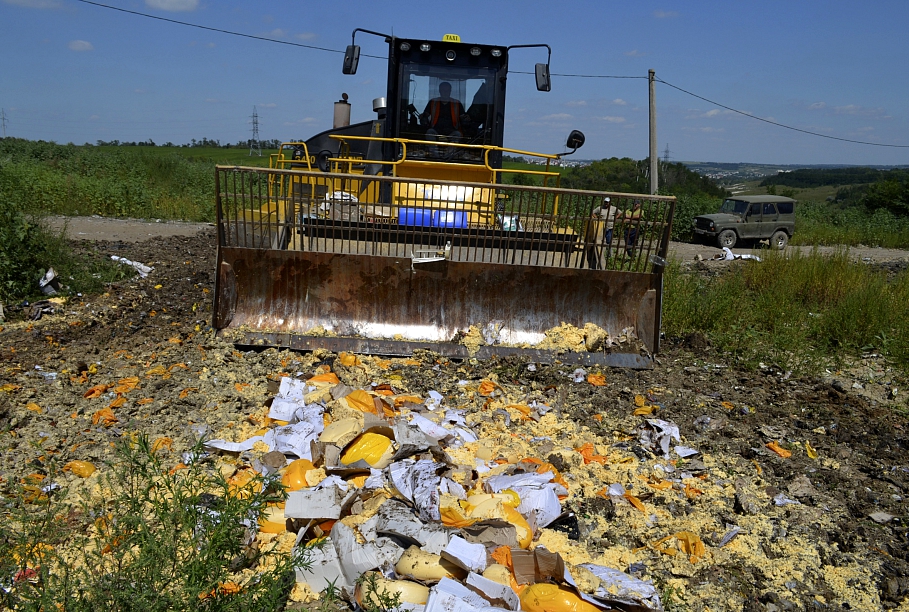Thus, for instance, we read in the press today that in the Sverdlovsk District, the authorities have ordered local libraries to get rid of books by the distinguished British historians John Keegan and Anthony Beevor about World War II and its end.
In Beevor's case, the local authorities are upset about the book "Berlin: The Downfall 1945," in which the author has written extensively about the barbaric way in which Stalin's Red Army treated civilians. The authorities have declared that "many historians believe that authors such as Keegan and Beevor misinterpret information about events during World War II, finding themselves in contradiction to historical documents and writing books that are saturated with Nazi propaganda."
One suspects that these officials would find it hard to find those "many historians" who believe that the Soviet military in Germany behaved like an aristocratic lady at an afternoon tea, but just a few minutes allow one to find a report, for instance, from the US Central Intelligence Agency, which states among another things that at war's end, "Berliners were still reeling from the orgy of pillage, raping and murder that had followed the Soviet occupation. Soviet soldiers careened through streets in lend-lease jeeps in search of violence, booty, and liquor."
Surely we cannot think of the CIA as an institution that is "saturated with Nazi propaganda." Also, it goes without saying that other examples of this type can be found again and again. For instance, a report about a woman who, after suffering the horrors of war, wrote in her diary about a conversation in a cellar where she and other women were wearily hiding from the endless bombardment and discussing the attitude of Soviet soldiers. She quoted one of them sadly saying, " None of us is still a virgin, right?"
Also today we can think about a court in London which, last week, declared rather frankly that Russia was to blame for the death of Alexander Litvinenko, once an ally of Tsar Vladimir and later his enemy, among other things because it is specifically Russia that controls 97% of the world supply of the radioactive substance with which he was poisoned. The court did not name names, but its final report is still being produced.
One can read about this in detail in a commentary written by colleague Aivars Ozoliņš in the latest issue of Ir. I will only add that instead of extraditing the suspect for trial, the ruling party in Russia put him on its candidate list in the last election, and right now he is a member of the Russian Parliament.
When it comes to the category of sin, however, above all today we have to think about a different context, to wit -- news that the Russian government has ordered the destruction of all food products to which Russia's import bans theoretically apply, but which nonetheless have found their way to our neighboring country.
A representative of the regime is quoted as happily saying that when it comes to 20 tonnes of cheese from Latvia, "we will destroy the cheese in a mechanical way at a special facility that has all necessary permits and specialised equipment for this purpose."
The main thing here is not that Russia's regime shot itself in the foot with its import ban. Taken together, the food product market of those countries to which the import ban applies is much larger than Russia's own food product market. If food cannot be sold in Russia, companies sell it elsewhere.
In Latvia, too, the industry has, in many cases, shifted to other markets. The dairy product industry, for instance, has begun exports to distant China. What's more, the person who tried to smuggle the aforementioned 20 tonnes of cheese into Russia did not do so in the company's interests, but at least partly because the people of Russia themselves want products that one observer has described in the news media with the words "some import products were fairly cheap and yet at a high level of quality, so they were in demand in this category of residents."
"This category of residents" is the point here. What in God's name does it mean to destroy food in the first place? In a country in which thanks to the inconceivable arbitrariness of the regime, many people, including old-age pensioners, large families, war veterans, Chernobyl veterans, etc., live in deep poverty? Would any one of those people have objected against cheese from Latvia just because their country's Fuhrer has quarrelled with the entire civilized world?
And, of course, cheese from Latvia is not the only food product. Among other things, it is also reported today that since Tsar Vladimir signed the order on destroying "smuggled" food, the transport of such food to Russia has declined 10 times over. Here you go, people of Russia! Go ahead and starve. Our regime is "rich" enough to afford to destroy huge quantities of fully fresh and nutritious products.
What is more, it is unlikely that at the Kremlin and its related entities, cheese from France and wine from Italy are in short supply. Did you notice the photograph of the Kremlin's spokesman wearing a watch that costs more than half a million euros? Surely that is not a person who has decided that just because of the regime, he is giving up everything that is tasty.
We cannot call this anything other than a sin, a terrible sin.































